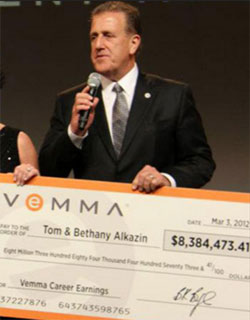Tom Alkazin slapped with preliminary injunction (Vemma)
![]() Last October the FTC filed a motion asking Judge Tuchi to “clarify or reconsider” the Vemma preliminary injunction.
Last October the FTC filed a motion asking Judge Tuchi to “clarify or reconsider” the Vemma preliminary injunction.
Specifically, the FTC sought to ‘enjoin Defendant Tom Alkazin from engaging in certain business activities.‘
The FTC argued that while the court intentionally excluded Alkazin ‘from the injunctive provisions relating to pyramid marketing‘, it might have
unintentionally excluded him from the provisions related to deceptive income claims, furnishing materials that contain false or misleading representations, and submitting new marketing or sales material to the FTC for review before publishing.
In addition to requesting the court clarify if this was the case, the FTC also asked it to
reconsider its finding and ruling as to Defendant Alkazin’s injunctive liability for marketing a pyramid scheme based on his participation in (rather than control of) the scheme, and place him under the provisions of Section I.A of the Order.
Inclusion of Section I.A of the order would see Alkazin subject to the same restrictions as Vemma and BK Boreyko.
Now, roughly eight months after the FTC filed their motion, Judge Tuchi has finally ruled on the matter.
 Acknowledging that Alkazin (right) ‘did not oppose the FTC’s request’, the court granted the FTC’s motion with respect to ‘deceptive income claims, furnishing materials that contain false or misleading representations, and submitting new marketing or sales material to the FTC for review before publishing‘.
Acknowledging that Alkazin (right) ‘did not oppose the FTC’s request’, the court granted the FTC’s motion with respect to ‘deceptive income claims, furnishing materials that contain false or misleading representations, and submitting new marketing or sales material to the FTC for review before publishing‘.
With respect to the FTC’s motion on Section I.A of the preliminary injunction;
Mr. Alkazin again did not oppose the FTC’s request and the Court again agrees with the FTC’s analysis.
Accordingly, the Court will grant the FTC’s Motion, and Mr. Alkazin will be subject to the injunctive provisions contained in Sections I.A through I.E of the Preliminary Injunction Order.
As it stands, Tom Alkazin is now subject to the same restrictions as Vemma and Boreyko.
Alkazin was quick oppose Judge Tuchi’s decision, through an emergency motion filed the same day as the order.
In his motion, Alkazin asks the court to vacate its order. Explaining why he didn’t file a response, Alkazin’s attorney writes
Mr. Alkazin did not file a response to that motion because, pursuant to Local Rule 7.2(g), “[n]o response to a motion for reconsideration . . . may be filed unless ordered by the Court, but no motion for reconsideration may be granted unless the Court provides the opportunity for response.”
Mr. Alkazin was never ordered to file, and thus was not permitted to file, a response to the FTC’s motion.
Considering Judge Tuchi explicitly wrote ‘Mr. Alkazin did not oppose the FTC’s request, which prompts its summary disposition, and in any event the Court agrees with the FTC’s analysis‘, Alkazin’s lack of opposition appears to be a moot point.
Alkazin is also claims the decision to wholly include him in the Vemma preliminary injunction is ‘a substantial expansion of existing law‘.
Mr. Alkazin takes issue with the factual statements made in the FTC’s motion.
Mr. Alkazin also wishes to bring to the Court’s attention other authorities and argument contrary to the authorities cited by the FTC.
Moreover, application of the additional terms of the preliminary injunction, as directed by the Court’s June 30, 2016 Order, would have significant negative consequences on Mr. Alkazin and his professional reputation.
Alkazin has asked for permission to file a response to the FTC’s motion ‘no later than July 11, 2016‘.
Again, with Judge Tuchi already acknowledging agreement with the FTC, I’m not to sure what the point of a response from Alkazin would be.
At the time of publication, a decision on Alkazin’s motion has yet to be filed. Stay tuned…
Footnote: Our thanks to Don@ASDUpdates for providing a copy of Judge Tuchi’s June 30th order and Tom Alkazin’s “Emergency Motion to Vacate Order on Motion for Reconsideration”.
Update July 7th 2016 – Judge Tuchi has partially granted and denied Tom Alkazin’s motion.
The FTC’s Motion was not strictly one for reconsideration, but also a request for clarification, and thus a Response in opposition by Mr. Alkazin would have been appropriate.
Even when applying LRCiv 7.2(g) to the FTC’s Motion, Mr. Alkazin could have filed a motion for leave to file a Response, which he did not do.
While the Court did not base its ruling solely on Mr. Alkazin’s failure to respond to the FTC’s motion, the Court does not find it unreasonable that Mr. Alkazin believed the FTC’s motion fell under the purview of LRCiv 7.2(g).
The order granting a preliminary injunction is now on hold in abeyance, pending a response filing from Alkazin.
The FTC will be given an opportunity to reply to Alkazin’s response before Judge Tuchi makes a ruling.
Update July 21st 2016 – Tom Alkazin filed a response to the preliminary injunction motion on July 15th. The FTC have yet to file their reply.


Article updated with news of Alkazin’s preliminary injunction order now held in abeyance.
I am so very angry and upset at the Alkazin family and there recklessness of their marketing of Vemma.
Thanks to them I am now mopping up the mess and recruiting former Vemma distributors into our business. That family should be “BANNED” from mlm altogether.
In all my years associated with mlm I am ashamed what there group did to destroy Vemma. Ashamed of the owner of Vemma did nothing to stop their behaviour especially of the YPR GROUP.